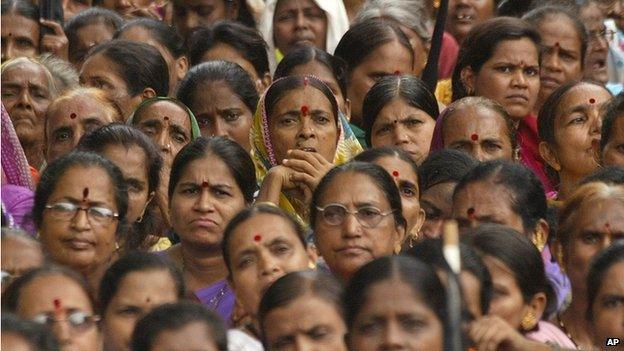Why motherhood makes Indian women quit their jobs
- Published

Thousands of women drop out of the work force in India
Barely a month after she informed her bosses in India that she was pregnant with her first child, a woman journalist got the shock of her life.
In her inbox was a curt termination letter from her employer, a leading news channel. Her performance, it said, had been "unsatisfactory".
She hit back and sued her employer.
She told the court that the "termination was illegal and flouted labour laws" by denying her the protection and benefits extended to pregnant women workers.
Three years later, the court instructed the channel to give her her job back with back wages. The channel has appealed against the ruling.
India's maternity laws allow working women three months of paid leave and job protection.
But the reality can often be different: India's labour courts received more than 900 complaints of denial of maternity benefits by employers between 2008 and 2012.
But most working women, when denied maternity benefits, do not go to court, they just stop working.
'Lot of guilt'
A survey of 1,000 women working in the capital, Delhi, and its neighbouring areas found that only 18-34% of married women continued working after having a child.
Mothers traditionally bring up children in India. Few employers provide flexible working hours or creche facilities, so many working mums end up quitting their jobs after having children.
"Even women who have family support or can afford to pay for child care have a lot of guilt. This is because of the social conditioning of women that their responsibility is to bring up children," says MP and leading businesswoman Anu Aga.
"Also, there is a tendency to give greater importance to a man's job than a woman's job in India. So, companies are not willing to make special allowances to integrate women after they take a break for becoming mothers."

Anjali Bhushan says her company wanted her to resume work immediately after having her baby
Anjali Bhushan had turned 30 by the time she decided to have a baby. It was a difficult pregnancy and her doctor advised her to take additional rest to recover from medical complications.
But when her paid maternity leave ended, the multinational company she worked for in Delhi wanted her to return immediately.
Ms Bhushan couldn't and had to quit. Four years on, she is a proud mother of a girl, but angry.
"Given a choice, why would I want to stay at home now?" she asks.
"The problem is that when we go back to work after becoming mothers, we are given less responsibility and unimportant projects since we can't stay for long hours. Companies start considering us the weakest link in the team."
Lowest rate
According to a 2013 World Bank study, external, only 27% of the female population aged over 15 is working in India. This is the lowest rate of women's participation in any workforce among the Brics (Brazil, Russia, India, China and South Africa) countries, with the highest in China at 64%.
Professor Padmini Swaminathan, senior researcher at Mumbai's Tata Institute of Social Sciences, says the situation is unlikely to improve soon.

Swagatika Das lost her job at a university after she became pregnant
"Increasingly, some women in India have been able to get higher education and jobs, but most still find it hard to say 'no' to marriage and immediate motherhood, and without other support, they then start disappearing from the workforce."
'Depressed'
Like Swagatika Das, who was a casual teacher at a college in Delhi University when she became pregnant.
"I kept asking them if I could get maternity leave and they kept assuring me for the same. But finally, neither did I get paid leave and when I came back they refused to give me my job back."
The whole experience took its toll on Ms Das. "I was depressed for almost a year," she says.
"The college principal did not respect me or my work. In fact he suggested that instead of joining college, I stay at home and bring up my boy. What right does he have to tell me what to do?"
Shiv Aggarwal, managing director of India's leading recruitment agency ABC Consultants, says this is a "uniquely Indian problem".
"Unlike the West, in India it is very common for employers to probe the marital status and family situation from a woman seeking a job. It is a big consideration in selection, so it is not wrong if women feel discriminated against."
Mr Aggarwal does point at a fledgling trend among big companies that are now providing child-care facilities and flexi-work options.
"But it still remains a huge challenge. A large majority of medium-level businesses don't have the financial infrastructure for this nor do they feel compelled in any way. After all there is no shortage of men in the work force."
- Published21 October 2010
